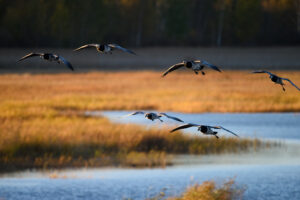The EU co-funded BONUS RETURN project is offering pre-commercialization support to top ideas for reducing nutrient and carbon emissions and productive reuse in the Baltic region, in a new competition.
The Baltic Sea’s ecosystems are threatened due to both marine and land pollution, endangering its current and future benefits to society. The Baltic Sea nutrients and carbon reuse challenge hopes to inspire eco-technological solutions that could not only reduce pollution but also provide major sustainability benefits through resource efficiency and recycling at scale.

Flock of Canada geese landing in the water on October evening in Espoo, Finland. Photo credit: Getty / Jekurantodistaja
Up to three of the best entries will be offered support through the pre-commercialization process as part of the BONUS RETURN project. The project will give the competition winners the opportunity to perform tests, match their product to local needs, obtain tailor-made procurement and business plans, connect with investors, and introduce their products to potential markets.
The winners will also have the chance to present their innovation to a group of investors, researchers and public-sector actors at the Baltic Sea Future Conference in Stockholm, 8–9 March 2018.
BONUS RETURN aims to collaboratively support small and medium enterprises (SMEs) that produce eco-technologies, by assessing their effectiveness in reducing nutrients and carbon, and deploying them using test-beds and commercialization at the project’s three case study sites in Sweden, Finland and Poland.
“We hope to find creative solutions with the potential to reduce the release of nutrients from wastewater and agriculture into the Baltic sea. This will be an opportunity for innovators to develop and test their prototypes in testbeds, with support from the project,” says Erik Kärrman, Group Manager at RISE, one of the BONUS RETURN partner institutes.
Apart from their ability to reuse nutrients and carbon, the eco-technologies will be assessed on their sustainability readiness based on the following criteria: health and hygiene, environmental issues, economy, socio-cultural dimensions and technical function.
“Phosphorous of high quality is a finite resource that must be considered globally, as it is essential to maintain food production. Greater recovery and the reuse of nutrients in wastewater is required in the future, as the potential for phosphorous recycling to agricultural land is very high. Therefore, innovations are needed to increase the proportions of nutrients that are reused in agriculture or other areas,” says Daniel Hellström, R & D Manager, Swedish Water and Wastewater Association.
The competition is open to European Union residents and organizations until 12 February 2018. Application is via the BONUS RETURN project website.
To be eligible for the competition, solutions must be a biological, physical or chemical intervention designed to minimize harm to the environment and provide services of value to society, that could be applied in the Baltic region. They must also be already implemented as prototypes, at Technology Readiness Level (TRL) 5 or higher, according to the EU framework programme H2020
Futher information on competition rules, assessment criteria and entry process.
Or contact Karina Barquet, SEI, Project Manager, BONUS RETURN
Brenda Ochola, SEI, Communication Officer, BONUS RETURN
Design and development by Soapbox.

